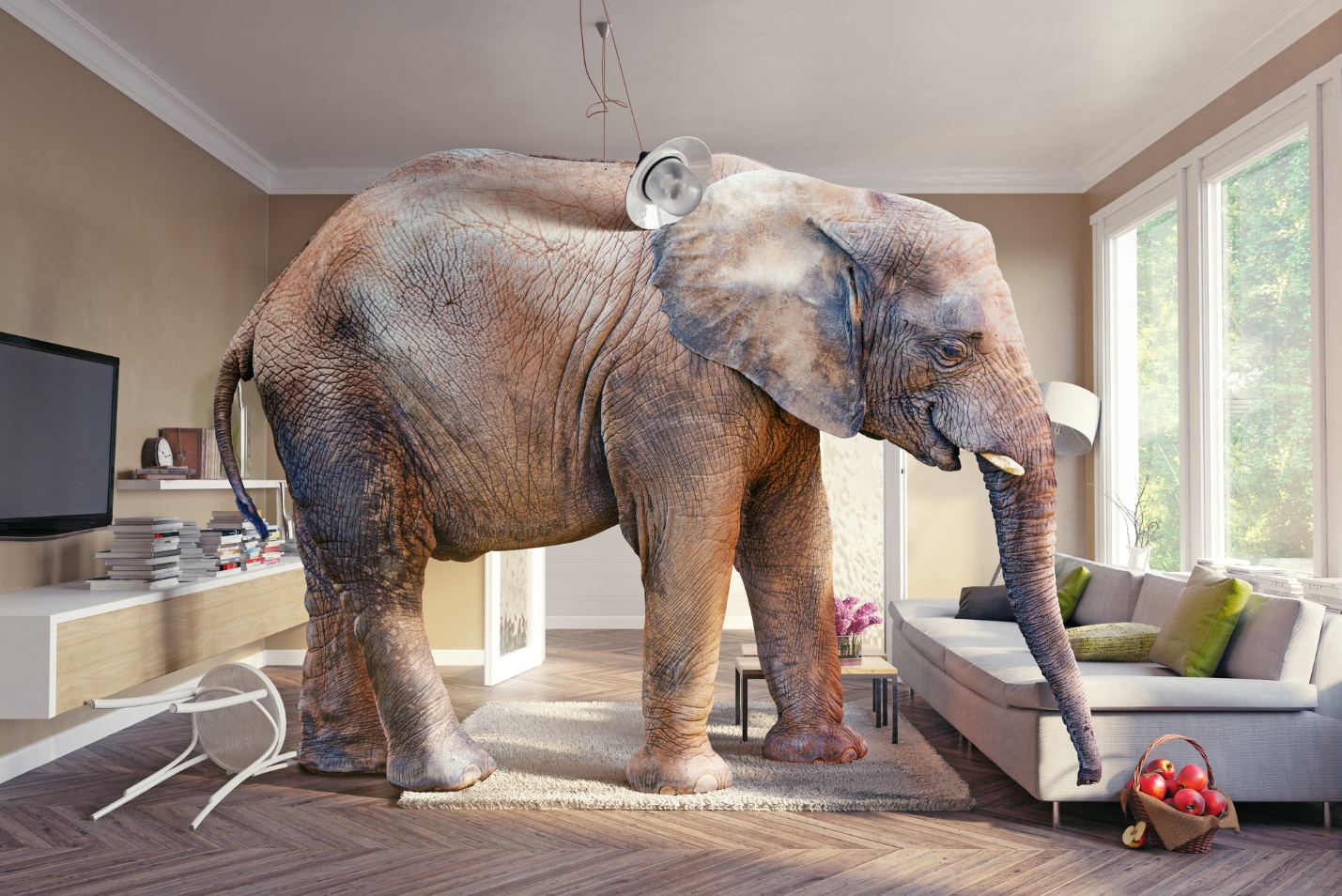BP 142

Emily’s father began drinking one beer a night. He later graduated to two and then three. He didn’t get irritable or angry when he drank. Rather, he became mellow and quiet. Emily experienced him as absent. He was physically present but on the borderline between buzzed and inebriated. Every night he disengaged from his wife and children around 7pm. Like clockwork. But nobody ever talked about it.
They ignored the elephant in the room.
La’Tosia was twenty-seven years old but still living with her parents. Her mother was highly critical of her passive father who was passive partly because his wife was so critical of him, and he felt like he could do nothing right in her eyes. So, he shut down around the woman who had very high standards and very little compassion in her heart. La’Tosia’s role in the family was to validate her mother’s complaints about her father and emotionally take her father’s place in her mother’s life.
This imbalanced family system seemed to function reasonably well as long as La’Tosia did not leave her parent’s marriage, as long as she played her part in the family triangle. If she ever left for a while even on a long-term missions trip, both La’Tosia and her mother experienced physical illnesses of elevated anxiety. Nobody ever talked about the unhealthy family pattern that left La’Tosia single, subconsciously afraid to leave her mother, and critical of men.
A big elephant lived in their house for a decade, and no one ever said, “Hey, look! What is this huge pachyderm doing in our living room? They had become accustomed to the presence of the elephant and did not wish to unsettle it by calling too much attention to it.
The Camden family consisted of six kids, one father disabled by a TBI, and a mother named Ruby who was a goddess among mere humans. Indeed, she read her Bible every day and was a very strong, moral person—to the outside world. Unfortunately, she was not a benevolent goddess. No, she was larger than life in an unhealthy way, inflamed by hypersensitivity, rage, and the ability to shame her children to the point of annihilation if they touched any of her many wounds from her childhood that she had never healed.

The old saying was very true of her: The more powerful a person is in a dictatorial way, the younger they are emotionally and the more primitive they are spiritually. Ruby was a scary person. She ruled the house. Even her husband feared her. But emotionally, she was three years old. She stopped growing when the sexual abuse had begun.
Whenever her children “abused” her in a manner even 1% similar to her father’s verbal abuse or threatened her fragile self in any way, she would project into them the badness she felt. So it was that her children often had to drink from the firehose of Ruby’s own shame whenever they wounded their mother. In truth, they had all become her scapegoats. In the case of Ruby and many other parents, unfinished business (shame, fear, rage, badness) from the past always gets passed on from one generation to the next.
Ruby the goddess continued to wear her divine diadem even when her oldest son attempted suicide; even after her daughter moved out of the house at sixteen accusing her mother of being a “rageaholic”; even when five of the six children became alcoholics; even when all of them walked away from the faith of their sovereign mother.
No one dared to awaken the elephant in the room named Ruby. They did not want to be emotionally murdered by the goddess who always destroyed those who destroyed her.
What elephants live in your house? These elephants might be in your literal house, or they might be in the house of your heart. These huge creatures silently lumber around your heart and home, but you successfully ignore them to your detriment.
Maybe you are following your parents’ example of not disturbing the elephants. Maybe you fear the consequences of awakening an angry rogue creature. Maybe you simply do not want to grow, or you are living out your role as a peacekeeper. Maybe Satan has blinded you to the massive creatures whose presence attests to your choice to settle for less in life and to let sleeping elephants lie (in more ways than one).

There are many types of house and heart elephants such as addictions (e.g., marijuana, pornography, gambling, the 2-3 nightly beers, work, video games, obsessive workouts to keep the body in perfect condition, maybe even an over-the-top preoccupation with health supplements); a thought life that reduces women to objects; anxiety that is self-medicated with sleep or escaping into a fantasy world; codependency that leads a person to always be nice and walk on eggshells around others; a family member with a mental illness or a propensity to control others who is never called out; a habit of hiding one’s heart due to fear of rejection or getting wounded or being too needy or being a burden to others; laughing when you need to cry; never looking inside your own heart but being quick to criticize other individual’s faults; ignoring the physical pain in your chest or abdomen; not questioning your husband when he stays up late on the computer; rationalizing your TV series purging; justifying your overeating; blinding yourself to the growing depression in your life; loving animals more than humans; increasingly dismissing the authority of God’s word in your life and listening instead to the culture around you; believing and feeding your obsessive thoughts; etc.
There are hundreds of different elephants.
Some elephants are easy to recognize. We simply must admit that they exist. Other elephants are more difficult to detect because they have been there so long that they blend into our surroundings like the paint on the walls or like the nondescript carpet. Some of these old elephants are lies from childhood or attitudes that are so deeply rooted that they seem normal.
An example of an ancient “lie elephant” is your subtle belief that you will only be loved if you are good enough or perform perfectly. An example of a deeply embedded “attitude elephant” is passively aggressively controlling the mood of the house with your grumpiness or Eeyore-like self-deprecation when you don’t get your way or when you feel disrespected or undervalued.
Some people only have one or two huge, domesticated elephants in their house or in the house of their heart. Others have an elephant in every room and in every closet. Some people will be trampled by their personal herd of elephants one day. They will die beneath their crushing weight and against their goring tusks.
What does it mean when you have elephants in your room?

When elephants live in your house or heart, it is a sign that you are denying the presence of problems in your life, refusing to speak of unhealthy conditions in your heart or home, or simply choosing to live with mental, physical, spiritual, or relational dysfunction. All these habits will shrink the size of your life and heart at the least and potentially kill you. You could die of heart disease, bitterness, aloneness, or self-sufficiency.
What are you to do with elephants in the room?
Do not ignore them! Do something! Speak of them. Point at them. The longer you let them cohabitate with you, the bigger they get and the more difficult it will be to shoo them out. Ask if other people see them. Ask God to empower you to face and destroy these enemies to your body and soul. Get help to drive them out. Seek out a friend, pastor, or counselor who herds elephants for a living.
Jesus calls you to growth. He does not want you to be white-washed tombs or unwashed cups. He wants you to be changed from one degree of glory to another instead of daily sinking an inch deeper into the quicksand of an unexamined life. There is no third option. It will be glory or quicksand.
Choose life, not death. For love. For joy. For glory.
Drive out the pesky pachyderms who are warts on your skin and cancer in your abdomen.
“Everyone then who hears these words of mine and does them will be like a wise man who built his house on the rock. And the rain fell, and the floods came, and the winds blew and beat on that house, but it did not fall, because it had been founded on the rock. And everyone who hears these words of mine and does not do them will be like a foolish man who built his house on the sand. And the rain fell, and the floods came, and the winds blew and beat against that house, and it fell, and great was the fall of it” ~ Matthew 7:24ff.
“But if you do not drive out the inhabitants of the land [the elephants in the room] from before you, then those of them whom you let remain shall be as barbs in your eyes and thorns in your sides, and they shall trouble you in the land where you dwell” ~ Numbers 33:55

